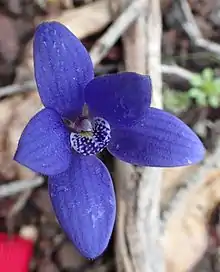| Blue china orchid | |
|---|---|
 | |
| Cyanicula gemmata growing in a Perth suburb | |
| Scientific classification | |
| Kingdom: | Plantae |
| Clade: | Tracheophytes |
| Clade: | Angiosperms |
| Clade: | Monocots |
| Order: | Asparagales |
| Family: | Orchidaceae |
| Subfamily: | Orchidoideae |
| Tribe: | Diurideae |
| Genus: | Cyanicula |
| Species: | C. gemmata |
| Binomial name | |
| Cyanicula gemmata | |
| Synonyms[1] | |
| |
Cyanicula gemmata, commonly known as the blue china orchid, is a plant in the orchid family Orchidaceae and is endemic to the south-west of Western Australia. It has a small, oval leaf and up to three intense blue to mauve flowers. It is the most common and widespread of the West Australian china orchids, sometimes appearing in large numbers after summer fires.
Description
Cyanicula gemmata is a terrestrial, perennial, deciduous, herb with an underground tuber. It has a single dark green, shiny leaf, 20–40 mm (0.8–2 in) long, 10–20 mm (0.4–0.8 in) wide and purplish underneath. Up to three intense blue to purplish flowers 20–50 mm (0.8–2 in) long and wide are borne on a stalk 40–150 mm (2–6 in) tall. The dorsal sepal is erect, 20–30 mm (0.8–1 in) long and 5–10 mm (0.2–0.4 in) wide. The lateral sepals and petals have about the same dimensions as the dorsal sepal. The labellum is 5–8 mm (0.2–0.3 in) long, 5–7 mm (0.2–0.3 in) wide, purple and blue and curves downward near its tip. There are many scattered small, bead-like calli covering the labellum. Flowering occurs from August to early November.[2][3][4][5]
Taxonomy and naming
The blue china orchid was first formally described in 1840 by John Lindley who gave it the name Caladenia gemmata in A Sketch of the Vegetation of the Swan River Colony.[6] In 2000, Stephen Hopper and Andrew Brown transferred the species to Cyanicula as C. gemmata.[7] The specific epithet (gemmata) is a Latin word meaning "jewelled", referring to the labellum calli.[3]
Distribution and habitat
Cyanicula gemmata is a common and widespread china orchid found between Kalbarri in the north and Israelite Bay in the east, growing in a range of habitats from heath to forest. Plants growing in wetter areas tend to flower more profusely after summer fires.[2][3][4][8]
Conservation
Cyanicula gemmata is classified as "not threatened" by the Western Australian Government Department of Parks and Wildlife.[8]
References
- 1 2 "Cyanicula gemmata". Australian Plant Census. Retrieved 14 October 2023.
- 1 2 Jones, David L. (2006). A complete guide to native orchids of Australia including the island territories. Frenchs Forest, N.S.W.: New Holland. pp. 29–30. ISBN 1877069124.
- 1 2 3 Brown, Andrew; Dundas, Pat; Dixon, Kingsley; Hopper, Stephen (2008). Orchids of Western Australia. Crawley, Western Australia: University of Western Australia Press. p. 189. ISBN 9780980296457.
- 1 2 Hoffman, Noel; Brown, Andrew (2011). Orchids of South-West Australia (3rd ed.). Gooseberry Hill: Noel Hoffman. p. 194. ISBN 9780646562322.
- ↑ Archer, William. "Blue China Orchid - Cyanicula gemmata". Esperance Wildflowers. Retrieved 12 April 2017.
- ↑ "Caladenia gemmata". APNI. Retrieved 12 April 2017.
- ↑ "Cyanicula gemmata". APNI. Retrieved 12 April 2017.
- 1 2 "Cyanicula gemmata". FloraBase. Western Australian Government Department of Biodiversity, Conservation and Attractions.